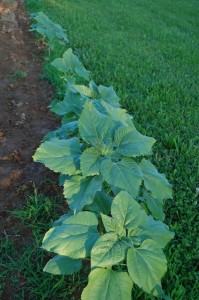 Last Day of the Easter Season
Last Day of the Easter Season
Tomorrow Pentecost begins. The birthday of the church! At my church we’ll wear red and celebrate the coming of the Spirit with wind and fire and bells.
But right now it is the last day of Eastertide. On Good Friday, April 2, our family and some friends spent a good portion of the day putting in a quarter acre garden. The Great Flood of Nashville hit a month later May 1-3. We suffered very little damage to personal property. With the exception of the garden. It was under eight-to-ten feet of water for most of two days. And it was pretty well destroyed.
In the three weeks since the flood, I’ve been away from Nashville on several trips. The replanting has fallen to my husband and daughter. Finding plants late in the season, warding off crows, battling weeds that took hold when the flood waters receded, and working around the weather have been the big challenges so far.
I said about the garden before the flood, “Seems like there ought to be lots to learn, lessons galore. And there are. They are just still growing. So let’s wait and see what arrives in season.”
More truth than I could have known, although I’m hesitant to spell it all out. The only lesson I’m willing to note at this moment, here at the end of Easter, and on the eve of Pentecost is that life is pretty uncertain and full of surprises.
Now I’m not opposed to surprises in general, and especially like them if they are of benefit to me. Hearing from someone I haven’t been in touch with for a while, receiving a gift, finding something that has been lost, learning something unexpected. These are delightful parts of life.
But disappointments. Well, that’s another story. I’m not a fan. And I’m well-defended against them. How? In several ways, but by far the most obnoxious is that I’m a “know-it-all” on too many subjects. I hate this part of my character. But you can see how it works, right? If I know a lot about myself and others and can predict how things will go for me and them, well, then I never really have to face disappointment, because I expected whatever happens.
Of course this is not possible. That’s why psychological theorists call these defenses. They are an attempt to defend our vulnerabilities and guard us from hurt and anxiety, but they are not always realistic or adaptive in the end. Mainly this is true because we can’t remain sheltered from the disappointments of living: death, loss, catastrophe, hurt.
This is why detachment is my most important spiritual practice. It is a major part of what centering prayer helps me to do. Detachment is a counterintuitive concept for many people. It made no sense to me when I first heard about the idea. (Because it can’t be summed up in one post, I’ll keep writing about it here in this blog in the weeks to come.) When I say I’m trying to practice detachment in a certain situation, what I mean is that I’m trying not to be attached to the outcome, and thus driven in my relationships and work in that situation to try and make my preferred outcome into reality.
Practicing detachment allows me to be present to what is happening around me. By not trying to control the outcome of a situation, I’m more able both to enjoy the surprises that come, and to be more honest about my feelings and experience when I am disappointed. It helps me to be more genuinely attentive. It also helps me to lay down my defenses against hurt and disappointment, which are inevitable parts of life.
This is the counterintuitive part: practicing detachment doesn’t mean I don’t care. Such a misunderstanding is common. It means I can care about what is happening more compassionately because I am not trying to control what is happening. This is the goal anyway. Hard to write about in a simple way. Harder to live. I don’t live it very well. I just keep practicing.
So back to the garden. It was both surprising and disappointing that we lost it. It was also disappointing that we had to re-plant it. And it was hard work for Lynn, which made for a little guilt on my part. And also a lot of gratitude that he would do it.
Maybe most significantly in this moment at the end of Easter and beginning of Pentecost, is the reminder for me that there is so little, really, that I do, know or make happen in the end. To live fully present to this moment and God’s grace in it, I have to keep practicing detachment. And if that’s the most important thing there is, well then that’s quite a lot to live for.



